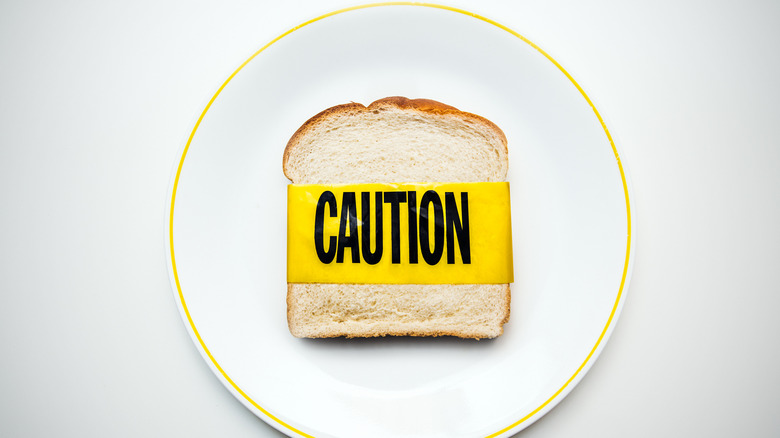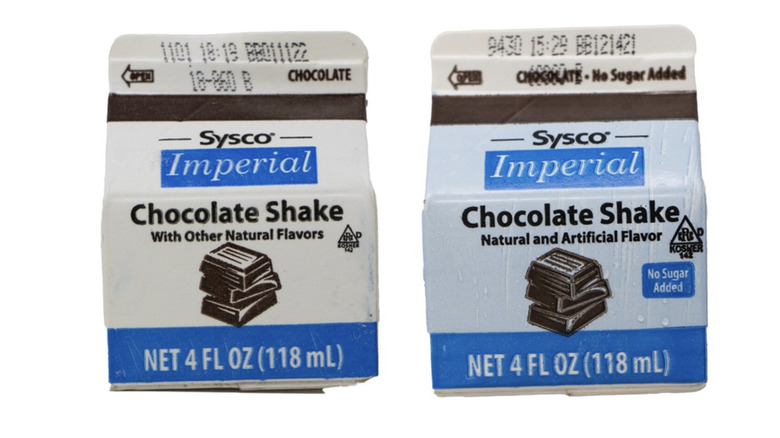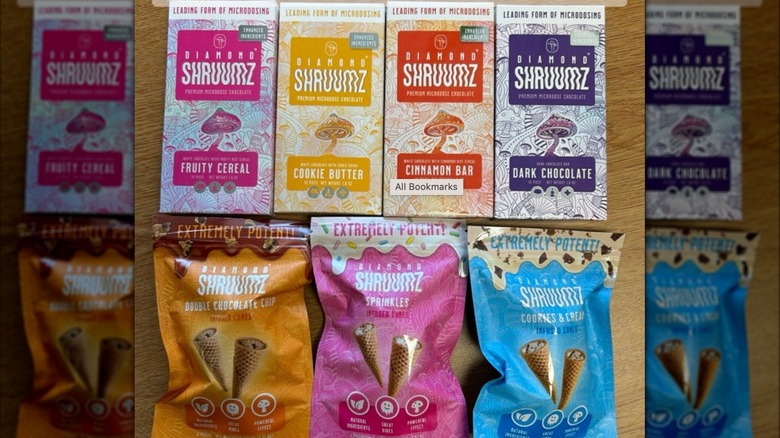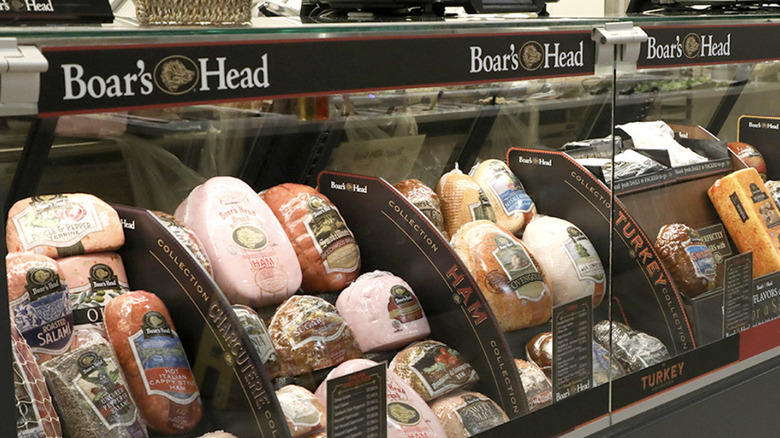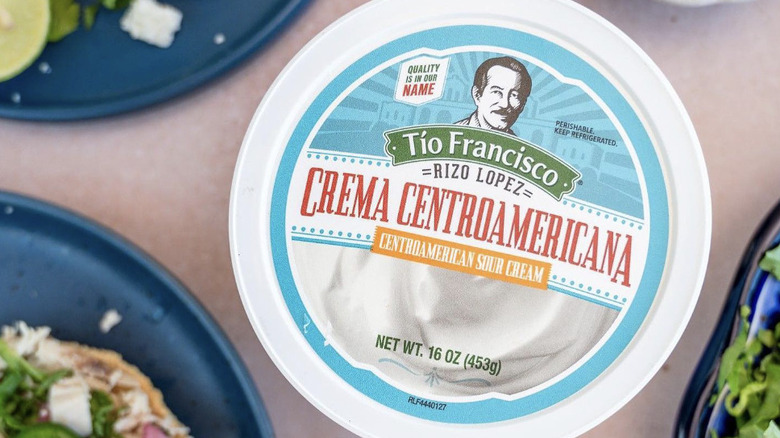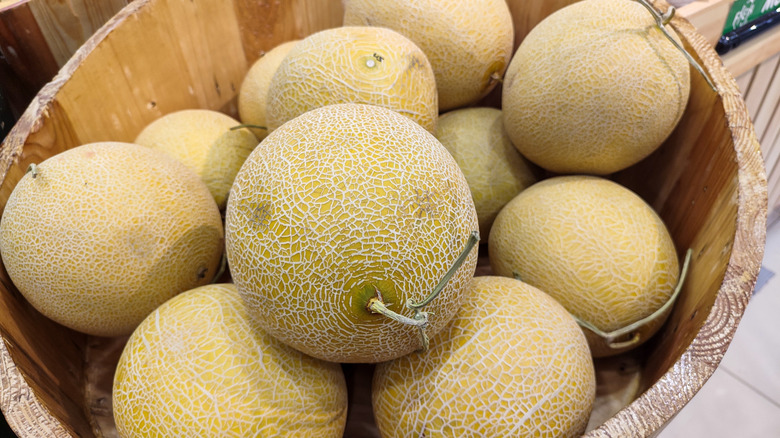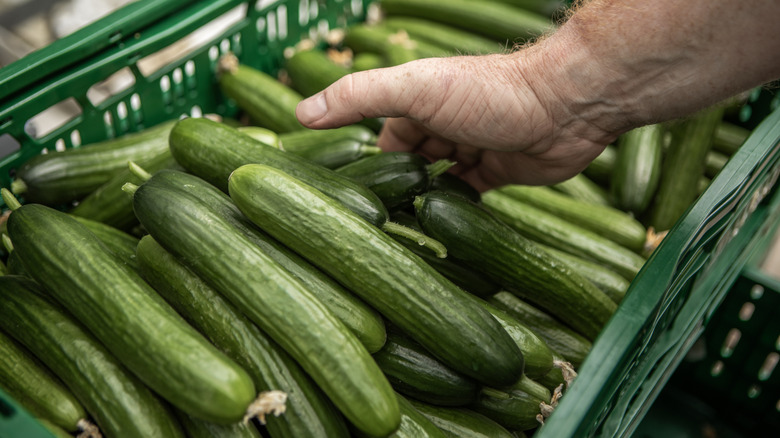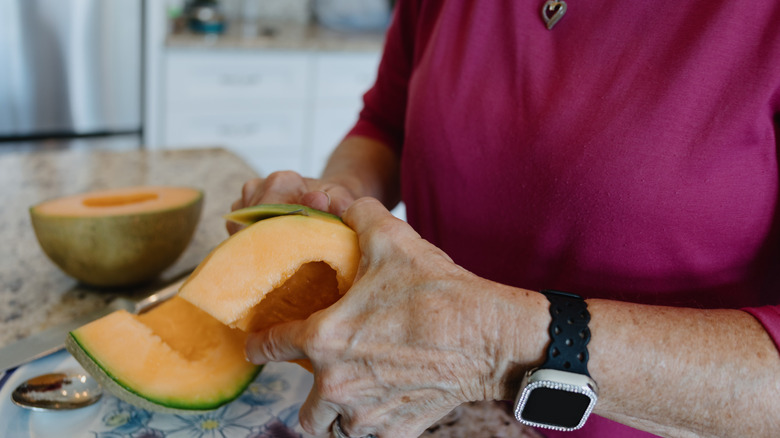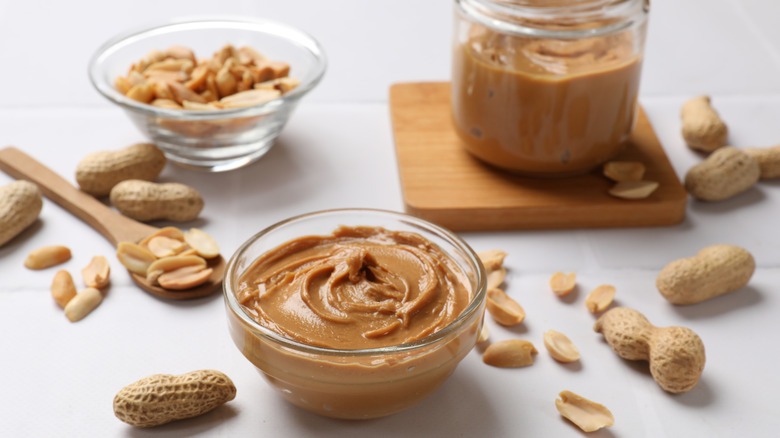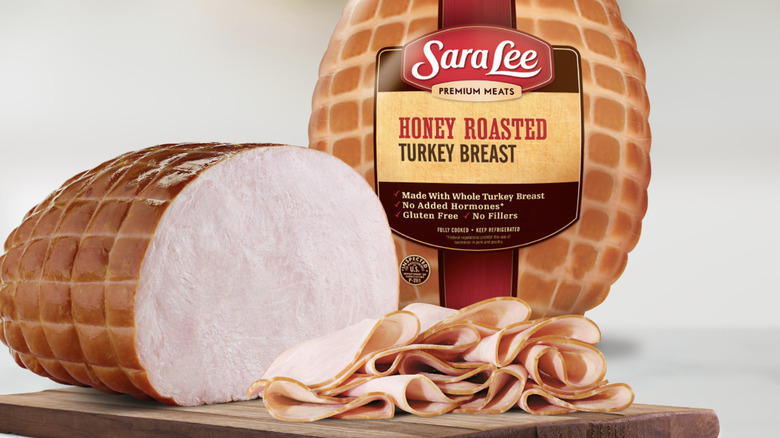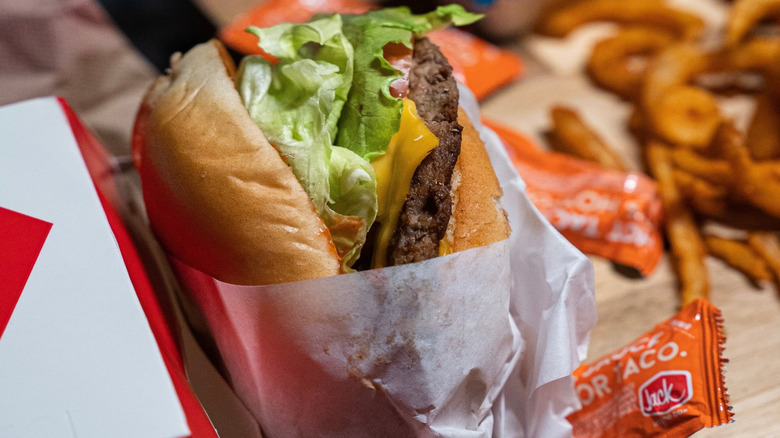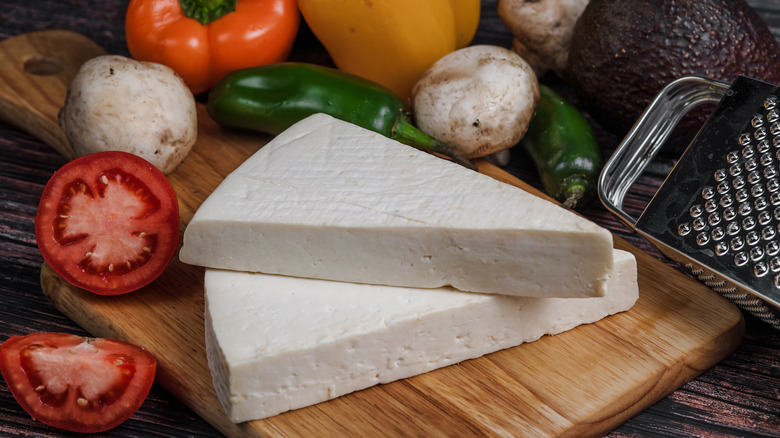14 Deadliest Food Recalls To Sweep The US
Food recalls, or the removal of products from supermarket shelves, are usually issued when an item is found to pose a health risk to consumers. This can occur for a range of reasons, including mislabeling and contamination with bacteria or a foreign object like metal or plastic. Unfortunately, in 2024, the U.S. experienced a significant increase in foodborne illnesses caused by contaminated goods, with approximately 300 safety alerts linked to nearly 1,400 illnesses. Of these cases, 487 required hospitalization and 19 resulted in death, doubling the number of similar incidents reported in 2023 (via U.S. Public Interest Research Group).
While most food recalls are precautionary, others are announced in response to confirmed outbreaks that have already landed consumers in the hospital or even killed them. When it comes to product withdrawals linked to severe illness or death, by far the most common culprits are listeria, salmonella, and E. coli. These pathogens can be especially dangerous to vulnerable groups such as children, the elderly, and individuals with weakened immune systems.
Ready to find out about the deadliest food recalls to hit the U.S.? Take a look at our list of the 14 most devastating outbreaks and headline-grabbing recalls in history.
Lyons Magnus recalls Lyons ReadyCare and Sysco Imperial Frozen Supplemental Shakes over possible listeria contamination (2025)
Unlike most other recalled food products, Lyons ReadyCare and Sysco Imperial Frozen Supplemental Shakes never ended up on the supermarket shelves. Instead, they were distributed primarily to hospitals and residential care facilities. This meant that once the news of a listeria contamination broke in February 2025, the affected individuals were among some of the most vulnerable. Perhaps this is one of the reasons why the outbreak had such a devastating effect. By May 16, the supplement shakes had been linked to at least 14 deaths and 41 hospitalizations.
Manufactured by Prairie Farms Dairy (which raised the alarm) and distributed by Lyons Magnus, the frozen supplement shakes affected people in 21 states. Overall, 17 Lyons Magnus products were suspected to have been tainted with listeria, including ReadyCare Frozen Vanilla Shake, ReadyCare Frozen Chocolate Shake, and Imperial Frozen Strawberry Shake.
The consumption of food contaminated with listeria can have serious consequences, as demonstrated by this tragic outbreak. Even healthy individuals can be affected, often suffering from fever, muscle aches, nausea, and diarrhea. The situation can become much more serious for high-risk groups, including children, the elderly, and those with compromised immune systems — even leading to death.
Prophet Premium Blends recalls Diamond Shruumz bars, cones, and gummies after reports of severe illnesses and deaths (2024)
In June 2024, the FDA initiated an investigation into Diamond Shruumz, when it became clear that several individuals who had consumed the brand's products — including microdosing chocolate bars, micro-dose and mega-dose/extreme gummies, and infused cones — had become ill. More specifically, consumers had reported experiencing a range of concerning symptoms including seizures, loss of consciousness, nausea, vomiting, and abnormal heart rates. In total, the edibles were linked to 180 illnesses, 73 hospitalizations, and possibly three deaths. The products had been distributed nationwide through brick-and-mortar stores and mail order services.
While it has never been clear what ingredient or ingredients in the products caused people to become unwell, the initial stages of the investigation focused on muscimol, which was used in some of the products. Muscimol is a psychoactive substance found in amanita muscaria mushrooms. The edibles were also found to contain acetylpsilocin, psilocin, pregabalin, desmethoxyyangonin, dihydrokavain, kavain, and ibotenic acid in various doses and compositions, all of which could have contributed to the adverse reactions reported by consumers.
Boar's Head recalls deli meat and poultry due to listeria outbreak (2024)
Boar's Head claims to take food safety very seriously, stating on its website: "Strict food safety standards and protocols are embedded in our processes and procedures, which extend from our manufacturing facilities to our suppliers and partners" (via Boar's Head). Unfortunately, these lofty promises didn't align with reality when the company had to recall its deli meats in 2024, following concerns over listeria contamination. The recall affected more than 70 Boar's Head ready-to-eat deli products, amounting to 7 million pounds of meat and poultry. The products had been sold across the U.S., as well as the Cayman Islands, Dominican Republic, Mexico, and Panama.
On September 26, 2024, CNN reported that the listeria-tainted deli products had been linked to 59 hospitalizations and 10 deaths in 19 different states. All in all, these numbers were probably higher, as symptoms of listeria can take up to 10 weeks to develop. In 2025, Boar's Head was ordered to pay a $3.1 million class action settlement as compensation for customers who bought the recalled products between May 10 and August 12, 2024. The company also faced wrongful death lawsuits, one of which involved a Holocaust survivor who died after consuming the contaminated products.
Rizo-López recalls dairy products due to possible listeria contamination (2024)
The Rizo -Lopez recall was so alarming that in October 2024, a federal court issued a permanent injunction against the company, barring it from manufacturing certain food products until it meets federal food safety laws. The recall, which was initiated in February of the same year after a deadly outbreak of listeria, involved dozens of products. These included cheese, yogurt, and sour cream items, such as Tío Francisco Centroamericana, Tío Francisco Crema Mexicana, and San Carlos Queso Crema. The products were sold in a range of stores, including El Super, Northgate Gonzalez, El Rancho, Vallarta, Food City, and La Michoacana.
The FDA Deputy Commissioner for Human Foods, Jim Jones, highlighted the public health risk of the contamination at the time, saying, "Producers of fresco-type cheeses are responsible for producing safe food and complying with food safety laws and regulations. Through this unfortunate outbreak, we see what can happen when a company fails to meet their legal responsibilities" (via Food Safety News). These weren't just empty words. The impact of this listeria contamination was truly devastating, resulting in 23 hospitalizations, two deaths, and one miscarriage.
Several brands recall cantaloupes due to possible salmonella risk (2023)
Characterized by sweet, orange flesh and a rough, tan-hued rind, cantaloupes are a popular addition to smoothies, fruit salads, and desserts. Unfortunately, in 2023, cantaloupes received a lot of attention for all the wrong reasons, when they were linked to a salmonella outbreak. In fact, the contaminated fruit was likely responsible for 407 illnesses, 158 hospitalizations, and six deaths.
The recall affected whole cantaloupes sold under a range of brand names, such as TruFresh, Crown Jewels Produce, Pacific Trellis, and Malichita/Z Farms. Several products that included cut cantaloupes were also affected by the recall, like fruit cups, clamshells, and trays.
The onset of salmonella infection usually takes place within 12 to 72 hours of the consumption of a tainted product, with most healthy adults recovering from the infection within seven days. The symptoms of the foodborne bacteria include diarrhea, stomach cramps, and fever. Children, the elderly, and people with weak immunity may experience more severe symptoms, which in some cases may even lead to hospitalization and death.
Andrew & Williamson Fresh Produce recalls cucumbers after a salmonella outbreak (2015)
Packed with essential vitamins, minerals, antioxidants, and dietary fiber, fresh produce is a supermarket staple that is supposed to offer a healthier alternative to processed or packaged food. This makes it all the more shocking when fruit and vegetables cause illness, as in the salmonella outbreak that prompted a major cucumber recall in 2015.
The cucumbers, which were imported from Mexico by Andrew & Williamson Fresh Produce, sickened more than 900 people in 40 different states. Of those infected after eating the tainted cucumbers, a staggering 204 people had to be hospitalized, with six people in Arizona, California, Oklahoma, and Texas succumbing to the infection — including a 99-year-old woman. The cucumbers were sold under the brand name "Limited Edition." At the end of the day, Andrew & Williamson Fresh Produce pulled 174 bulk-packed containers of the produce from grocery stores around the country.
To explore similar outbreaks involving fresh fruit and vegetables, take a look at our article on produce recalls that affected millions.
Forever Cheese recalls cheeses due to outbreak of listeriosis (2012)
While only 22 people were reported to have been sickened by Frescolina Marte's listeria-contaminated Ricotta Salata, three of those affected were newborns. In addition, the incident ended up leading to four deaths. These numbers highlight that even a relatively low number of listeria infections can result in devastating outcomes.
Forever Cheese announced a recall of Frescolina Marte Ricotta Cheese on September 10, 2012 — the recalled product had been manufactured in Italy by Fattorie Chiarappa. A few days later, Forever Cheese expanded the recall, pulling all other Fattorie Chiarappa cheeses off the grocery store shelves. The cheeses had also been shipped to wholesalers and restaurants across the U.S. At the time, the FDA placed Fattorie Chiarappa on Import Alert, banning it from importing products into the U.S. until the company could demonstrate its products were free of listeria. For more cases of recalls that involved dairy, don't miss our article on cheese recalls that affected millions.
Jensen Farms recalls cantaloupes after they are linked to listeria outbreak (2011)
The cantaloupe recall of 2011 was no joke — the contaminated fruit ended up being tied to 147 cases of illness and 33 deaths. The alert was raised on September 14 when Jensen Farms announced a recall of its Rocky Ford cantaloupes after investigations revealed they were the likely cause of an outbreak of listeriosis. Other brands that sourced their cantaloupes from Jensen Farms, including Carol's Cuts and Fruit Fresh, followed suit, issuing their own recalls of the tainted melons.
According to reports, the Jensen Farms facilities had sanitation problems that likely led to the contamination, including standing pools of water and poorly sanitized equipment. In 2013, federal prosecutors brought charges against the owners of Jensen Farms, Eric and Ryan Jensen, for their role in the fiasco. More specifically, the duo was charged with six counts that led to the introduction of the contaminated cantaloupes into commercial circulation. At the end of the day, each defendant received five years of probation, six months of home detention, 100 hours of community service, and had to pay $150,000 in restitution to the victims of this tragedy.
SanGar Fresh Cut Produce recalls all products over listeria fears (2010)
In October 2010, the Texas Department of State Health Services instructed SanGar Fresh Cut Produce to issue a market withdrawal of all products distributed from its San Antonio plant since January. The agency also ordered the company to cease all production due to "an immediate and serious threat to human life." The decision came after celery processed at the facility tested positive for listeria monocytogenes.
The listeriosis outbreak resulted in 10 cases of illness, five of which proved fatal. The infections were linked to fresh produce that had been cut and distributed in sealed packages. The infections occurred in Texas, with all affected individuals reporting serious health problems. In an ironic twist, in August of the previous year, the owner of SanGar, Kenneth Sanquist, spoke to a San Antonio TV station about the facility's stringent safety standards. "All we're saying is everyone should have that standard. There is an entire process that we have to follow on a daily basis, if you miss a step or two steps or try to take a shortcut ... children could get very sick," Sanquist noted (via Food Safety News).
King Nut and other companies recall peanut butter due to salmonella contamination (2008 and 2009)
The peanut butter salmonella contamination that came to light in 2008 resulted in one of the largest food recalls in U.S. history, involving over 3,600 products from different companies. The tainted peanut butter and peanut paste were traced back to the Peanut Corporation of America, which supplied the products to the affected companies. In total, a staggering 714 people in 46 states fell ill after eating the contaminated products. The salmonella outbreak also claimed nine lives.
The peanut butter disaster resulted in multiple civil lawsuits against the Peanut Corporation of America. For instance, the family of one nursing home resident who died after consuming the peanut butter filed a wrongful death lawsuit against the company. Furthermore, in 2015 Stewart Parnell, the former CEO of the Peanut Corporation of America, was sentenced to 28 years in prison for his role in the deadly outbreak. Significantly, investigations revealed that Parnell had knowingly shipped products contaminated with salmonella. Some of the company's other former executives also received prison sentences for their involvement in the cover-up.
Dole Food Company recalls baby spinach due to possible contamination with E. coli (2006)
Fresh greens are supposed to nourish your body, not make you feel unwell. Unfortunately, that's what happened when Dole Food Company issued a recall for E. coli-contaminated spinach in 2006. More precisely, the nationwide alert involved bagged baby spinach under 28 brand names — all sourced from Natural Selection Foods.
The investigation identified four spinach fields as potential points of origin of the contaminated produce. The specific strain of E. coli that contaminated the spinach was found in nearby cattle fields and in a wild boar killed in the area, suggesting that animal waste could have affected the produce. The E. coli outbreak linked to the spinach resulted in 205 cases of foodborne illness, 104 hospitalizations, and four deaths. A total of 31 people also suffered hemolytic uremic syndrome, an infection caused by the E. coli bacteria that causes blood clotting and can affect the kidneys and other organs.
Sara Lee recalls deli meats and hot dogs amid listeriosis outbreak (1998)
From classic cheesecakes to pound cakes, Sara Lee is most famous for its baked goods and frozen desserts. However, the company also sells deli meats like Mesquite Smoked Turkey and Honey Ham. It's the deli part of the business that made headlines in 1998, when the brand's meats and hot dogs were linked to a deadly outbreak of listeriosis. The products were manufactured by Sara Lee's subsidiary, Bil Mar Foods. Sara Lee ended up pulling a massive 35 million pounds of meat and hot dogs from supermarket shelves, which eventually became linked to 80 cases of listeriosis, 15 deaths, and six miscarriages.
An investigation revealed that Bil Mar Foods managers had knowledge of worrying listeria levels at the plant as early as eight months before the outbreak. Despite this, they continued to distribute the potentially tainted products. In 2001, Sara Lee pleaded guilty to one charge of supplying "adulterated poultry and meat products." The company ended up paying a $200,000 fine, committing $3 million to fund food safety studies at Michigan State, and paying $1.2 million to settle a lawsuit involving meat it had supplied to the Department of Defense.
Jack in the Box recalls hamburgers after E. coli outbreak (1993)
Recalls don't always involve store-purchased goods — sometimes, it's food served at restaurants that triggers nationwide health alerts. A case in point is the Jack in the Box hamburger recall that took place in 1993 following an outbreak of E. coli. More precisely, the infection was traced back to ground beef burger patties produced by Von Companies and used in fast food meals prepared at Jack in the Box, although no slaughterhouses responsible for the contaminated meat were ever identified. The contaminated burgers were sold at 73 Jack in the Box outlets in Washington, Idaho, California, and Nevada. The E. coli contamination sickened more than 700 people and resulted in 171 hospitalizations and four fatalities.
One of the worst parts of this tragedy is that Foodmaker — the parent company of Jack in the Box — had been warned that its burgers were being undercooked. Still, the company chose not to cook them to the mandated 155 degrees Fahrenheit, claiming that this would make the beef overly tough. In fact, the 1993 Jack in the Box E. coli tragedy resulted in food safety protocol reforms, with E. coli infections becoming a reportable disease. The incident also led to more thorough meat and poultry inspections. Finally, the cooking guidelines for ground meat were changed, raising the required temperature from 140 to 155 degrees Fahrenheit.
Jalisco recalls queso fresco and cotija cheeses linked to listeria outbreak (1985)
From brie and camembert to queso fresco and cotija, soft cheeses are well known for their creamy texture and mild yet rich flavor. Unfortunately, in 1985, these popular dairy products became the subject of extensive investigation during a listeria outbreak in California. The contamination was linked back to Jalisco Mexican Products, prompting a massive product recall. Almost 150 cases of listeria infection were tied to the Mexican style cheeses, 93 of which affected pregnant women and young children. In total, 28 individuals succumbed to the infection, including 18 adults and 10 babies. The listeria contamination also resulted in 20 miscarriages.
Facing scrutiny over the 1985 outbreak, Jalisco Mexican Products pointed the finger at its milk supplier, Alta-Dena Certified Dairy, alleging the contamination stemmed from the company's raw milk. Upon further inspection, investigators found that the company's processing plant was receiving more milk than it could safely pasteurize. It's no secret that unpasteurized milk can spread dangerous bacteria, including listeria. At the end of the day, both Jalisco's owner and the company's cheesemaker pleaded "no contest" to misdemeanor charges, receiving relatively short jail sentences and fines totaling around $48,000.
